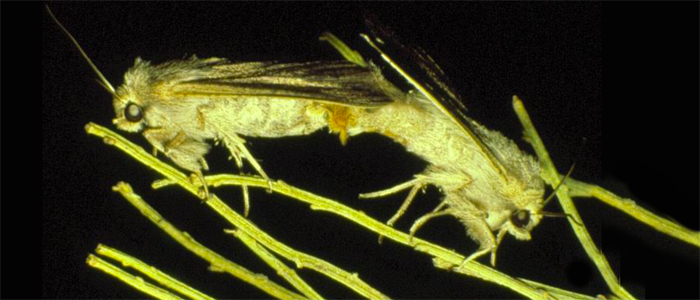McNeil Lab: A recent article published in PLoS ONE draws international media attention

Pellegrino,AC, Peñaflor MFGV, Nardi C, Bezner-Kerr W, Guglielmo CG, Bento, JMS and McNeil, JN. (2013) Weather Forecasting by Insects: Modified Sexual Behaviour in Response to Atmospheric Pressure Changes. PLoS ONE 8(10): e75004. doi:10.1371/journal.pone.0075004
Insects Modify Mating Behavior in Anticipation of Storms
Science Daily - Oct 02 2013
Insects modify calling and courting mating behavior in response to changes in air pressure, according to results published October 2 in the open-access journal PLOS ONE by Ana Cristina Pellegrino and José Maurício Bento, University of São Paulo, and colleagues from other institutions. The bugs' ability to predict adverse weather conditions may help them modify their mating behavior during high winds and rain, reducing risk of injury or even death.
Researchers studied mating behavior changes in the curcurbit beetle, the true armyworm moth, and the potato aphid under falling, stable, and increasing air pressure conditions. When researchers measured the male beetles' response to female sex pheromones under the different conditions, they found a significant decrease in pheromone response when air pressure fell compared to stable or increasing pressure. Furthermore, 63% of males started copulating faster in the presence of females during dropping atmospheric pressure, a condition associated with high rains and winds. By contrast, under stable or rising air pressure conditions, all males showed full courtship behavior.
Read More on Science Daily
Other articles
- Science
- Global Post
- The Times
- Yahoo News
- Science Update
- Eurekalert
- Science Media Centre of Canada (PDF)
- Centre Canadien Sciences et Médias (PDF)
Dr. Jeremy McNeil was featured on CBC's Quirks and Quarks on October 19, 2013. To listen to the podcast, visit the CBC website.
Posted October 4, 2013

